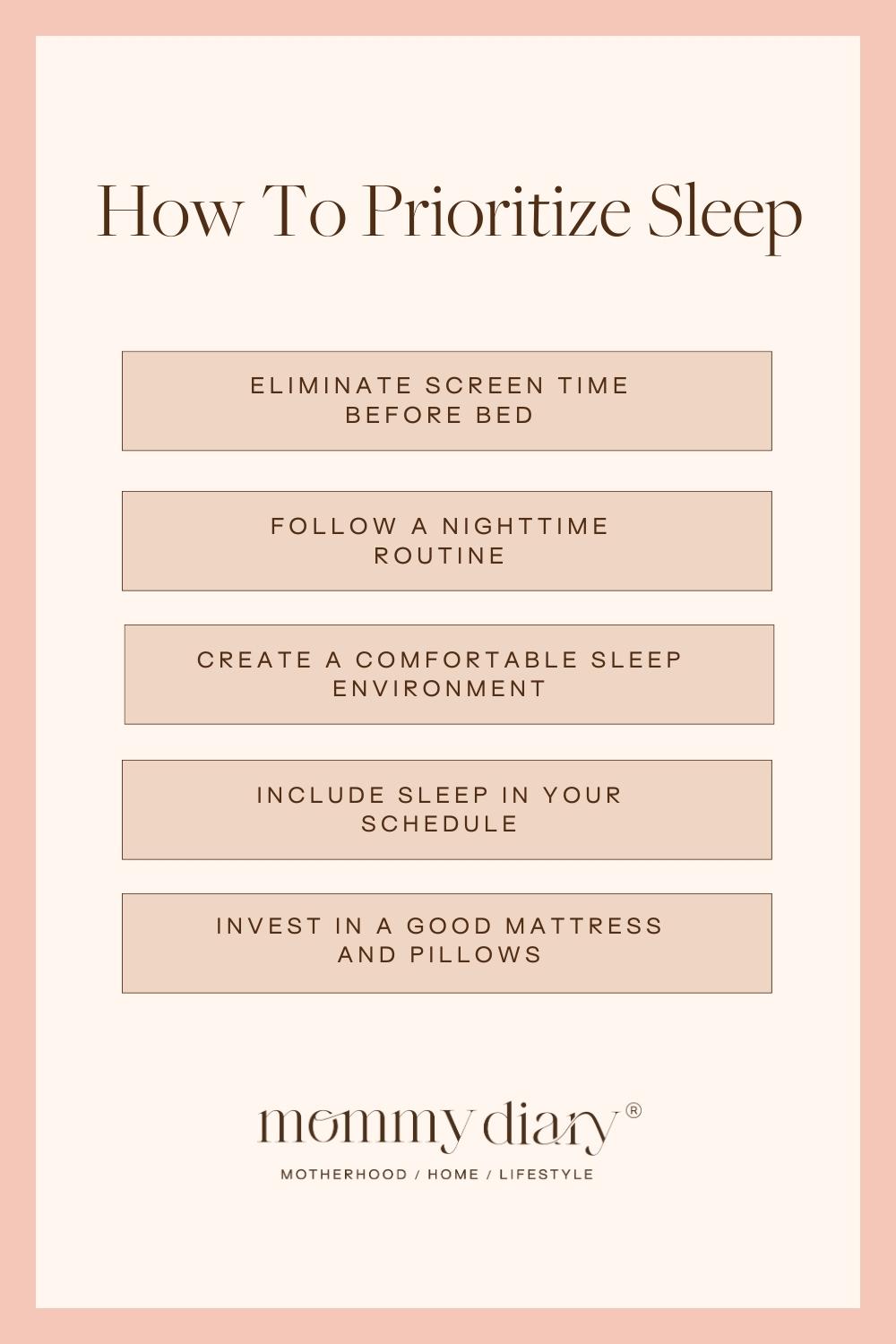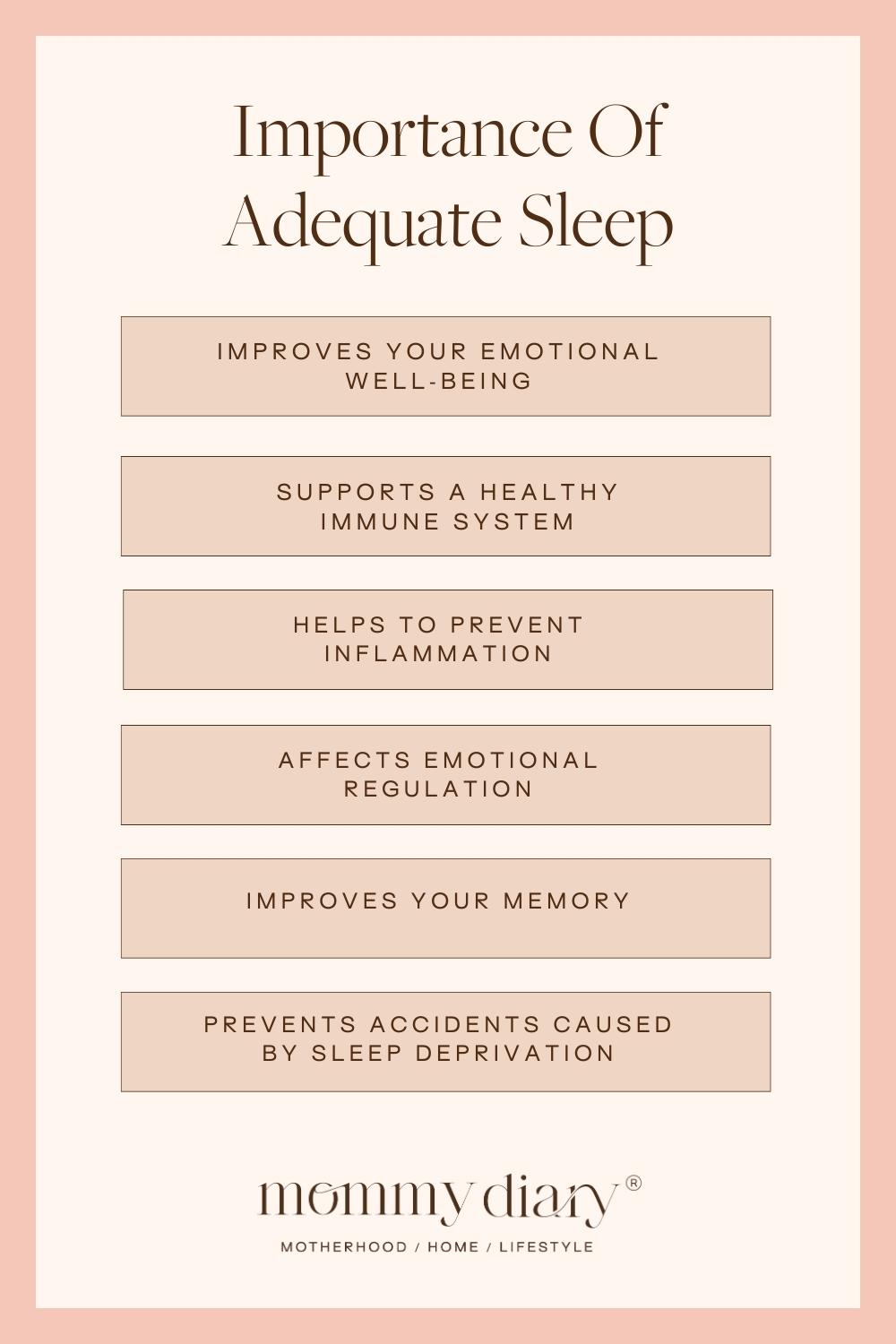As parents, we make a lot of sacrifices for our kids. Sleep is one of them. For one reason or another, from the day your baby is born, a good night’s rest can be hard to achieve. As a mom, I know firsthand how easy it is to neglect the importance of getting enough sleep. We’re doing so many things every day that rest is often put on the back burner. Just know, you’re not alone.
Still, it’s important to remember just how important sleep is–especially for parents. Sleeping is an essential function that allows your body to recharge. Sleep deprivation can lead to a variety of issues, including both physical and mental health issues. Unfortunately, there’s no magic cure for a lack of sleep when you have children to care for. However, consciously making sleep a priority in your life can make a big difference. This post is dedicated to helping you prioritize sleep no matter what.

How To Prioritize Sleep
Eliminate screen time before bed.
Spending time on any device can disrupt your body’s circadian rhythm. The screen of your phone, tablet, and other devices emits blue light, which has been shown to suppress melatonin production and cause a shift in your circadian rhythm. Avoid using your phone during the last hour or two of your day, or make your bedroom a technology-free zone. Try reading one of these great personal development books for women instead!
Follow a nighttime routine.
A nighttime routine is a great way to end the day and let your mind and body know that it’s time to sleep. What your routine looks like is entirely up to you, but you want to incorporate activities that relax you and help you wind down. You can soak in the tub or sip on a cup of tea. The most important thing is that you’re consistent. Follow your nighttime routine around the same time every night so that it will encourage sleep.
Create a comfortable sleep environment.
Your environment has a big impact on the quality of your sleep. Create a comfortable sleep environment that makes it easier to fall asleep and stay asleep. Consider these tips:
- Make your bedroom as dark as possible or use a sleep mask.
- Keep your bedroom cool. The ideal temperature range for quality sleep is between 60 and 68 degrees Fahrenheit.
- Block out outside noises to keep your bedroom as quiet as possible. A white noise machine can help prevent disturbances and make it easier to fall asleep.
- Keep your bedroom tidy and remove any visual distractions and clutter.
Include sleep in your schedule.
Prioritizing sleep means making it an important part of your daily schedule. A solid piece of your daily schedule should be set aside for sleep. Everything else you have going on should be scheduled for the rest of your day. It can be tempting to sacrifice sleep to get things done, but it’s too important to cut out.
Invest in a good mattress and pillows.
A good mattress and pillows are crucial to a good night’s sleep. Try different types of mattresses and pillows until you find what works for you. Treat yourself to quality blankets and pillowcases too. It’s a worthy investment that your mind and body will thank you for.
What Happens During Sleep That Is So Important?
Many important things happen when you sleep. When you sleep, your body can get the rest it needs for your overall health. Sleep, as well as your body’s circadian rhythm, plays a significant role in regulating hormone production. The quality of your nightly sleep as well as how many hours of sleep you get affects hormone production during the day.
While you’re asleep, your body produces melatonin, which helps with sleep, as well as growth hormone. This is important for your metabolism and muscle and bone development. Your body also produces cortisol, which controls how your body responds to stress, and leptin and ghrelin, two hormones that help control your appetite.
From the moment you fall asleep, your brain and body begin to slow down and start the recovery process. A lack of sleep and missing out on these important processes can affect your mood, concentration, energy levels, and more.
How Much Sleep Should You Get?
Exactly how much sleep you need varies for each person. The National Sleep Foundation recommends the following ranges depending on age:
- Newborns (0-3 months): 14-17 hours
- Infants (4-11 months): 12-15 hours
- Toddlers (1-2 years): 11-14 hours
- Preschoolers (3-5): 10-13 hours
- School-age children (6-13): 9-11 hours
- Teenagers (14-17): 8-10 hours
- Younger adults (18-25): 7-9 hours
- Adults (26-64): 7-9 hours
- Older adults (65+): 7-8 hours
The Four Sleep Stages
During a typical night of sleep, you go through four or five sleep cycles, with each one taking between 70 and 120 minutes. Each sleep cycle is broken down into four sleep stages. The four stages of sleep are broken down even further into two vastly different categories: non-REM and rapid eye movement sleep (REM).
The four sleep stages are as follows:
- Stage 1: Non-REM sleep (N1) that involves dozing off and transitioning into sleep. This stage typically lasts 1-7 minutes.
- Stage 2: Non-REM sleep (N2) during which your mind and body slow down. This stage usually lasts 10-25 minutes.
- Stage 3: Non-REM sleep (N3 or deep sleep) is when the body slows down even further to go into recovery mode. Brain activity also slows. This sleep stage typically lasts 20-40 minutes.
- Stage 4: REM sleep (REM sleep) during which the brain becomes more active again. The most intense dreams usually occur during REM sleep. Your heart rate and breathing increase. This stage usually lasts 10-60 minutes.

Importance Of Adequate Sleep
Helps with weight control.
Sleeping less than seven hours per night can potentially put you at a greater risk of weight gain and a higher body mass index (BMI). A lack of sleep affects your hormones and reduces your motivation to exercise–two factors that contribute to weight gain. Prioritizing sleep can help prevent weight gain and just overall support healthy body weight.
Improves focus and productivity.
Sleep is crucial for optimal brain function. Sleep deprivation negatively affects cognition, productivity, concentration, and performance. Alternatively, quality sleep has been linked to better problem-solving skills and memory performance.
May help to prevent heart disease.
Poor sleep quality and sleep deprivation can increase your risk of developing heart disease. Short sleep can also increase your risk of high blood pressure. One study found that people who get less than five hours of sleep per night had a 61% higher risk of developing high blood pressure than those who regularly got seven hours of sleep.
Reduces your type 2 diabetes risk.
People who regularly don’t get enough sleep are at a greater risk of developing type 2 diabetes. Sleep deprivation can cause physiological and behavioral changes that increase your diabetes risk. These changes include decreased insulin sensitivity, hormonal changes, poor decision-making, and greater calorie consumption.
Improves your emotional well-being.
Poor sleep is associated with mental health issues like depression. Insomnia is also commonly associated with anxiety. Getting enough quality sleep is crucial to your emotional well-being.

Supports a healthy immune system.
Lack of sleep can compromise your immune system. One study found that individuals who got less than five hours of sleep per night were 4.5 times more likely to develop a cold compared to those who slept more than seven hours.
Helps to prevent inflammation.
Not getting enough sleep has a significant effect on inflammation in your body. Sleep deprivation and disturbed sleep can promote inflammatory responses in the body. Chronic inflammation is a known cause of many health conditions, including heart disease, obesity, Alzheimer’s disease, some types of cancer, and type 2 diabetes.
Affects emotional regulation.
Regulating your emotions is much harder when you haven’t gotten the sleep your mind and body need. It can be difficult to control your feelings and emotional responses when you’re overly tired. As a result, sleep deprivation can negatively impact your relationships and social life.
Improves your memory.
One of the symptoms of sleep deprivation is difficulty remembering things. Adequate sleep is important for processing and storing memories from the day. Your brain needs that time to create new pathways for the information you learned, otherwise, it might be lost.
Prevents accidents caused by sleep deprivation.
Fatigue affects your ability to focus, as well as your reflexes and reaction times. According to The Centers for Disease Control and Prevention (CDC), 1 in 25 people have fallen asleep while driving. Individuals who slept for fewer than six hours were most at risk of falling asleep while driving.
Additionally, the CDC reports that being awake for more than 24 hours is comparable to having a blood alcohol content (BAC) of 1.00%, which is over the legal driving limit. Furthermore, lack of sleep can increase the risk of injuries and errors in the workplace.
No matter how busy life gets, sleep needs to be a top priority.
Parenthood is a round-the-clock, 24/7, 365 thing. It can leave you feeling like there are never enough hours in the day to get things done. But before you sacrifice a good night’s rest, consider the toll it can take on your physical and emotional well-being.
To be the best mom or dad you can be, you have to also take care of yourself. Prioritizing sleep is a crucial part of practicing self-care. Do yourself and your kids a favor and make sure you’re getting the sleep you need.
To read more about parenthood and all the ways you can live your best life every day, head over to the blog. Also, be sure to catch up on my podcast for more on all things motherhood!

